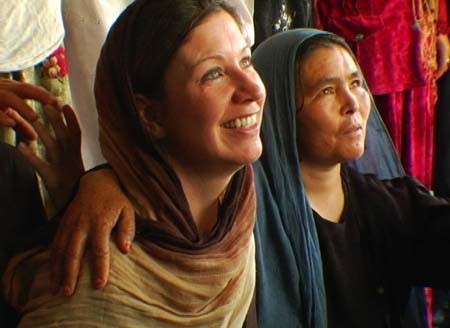

Reviews of Recent Independent, Foreign, & Documentary Films in Theaters and DVD/Home Video
Directed & Produced by Beth Murphy Camera, Kevin Belli & Sean Flynn Edited by Belli & Murphy Music by Evren Celimli Released by the Film Sales Company USA. 97 min. Not Rated Oh no, you might say to yourself, not another 9/11-related film; but the invigorating Beyond Belief gets past the anger and exasperation that pervades so many films, especially those concerning the wars in Afghanistan and Iraq, and is still as political as Fahrenheit 9/11 or Why We Fight. Patti Quigley and Susan Retik’s husbands were on the planes that hit the World Trade Center. Both were pregnant at the time. (David Retik was sitting in first class just feet away from hijacker Mohammed Atta.) In 2003, the two single mothers from the affluent Boston suburbs set up the Beyond the 11th organization, raising over $100,000 for widows – in Afghanistan – to rid a root cause of terrorism, poverty. The group’s practical goal comes down to chickens and eggs: to pay for incubators to raise chicks. After 23 years of war, an estimated 500,000 Afghani widows earn an average of $16 a month (compared to $46 for men). If she remarries, her children would then go to live with their deceased father’s family, according to tradition. Quigley and Retik travel to Afghanistan to see for themselves who will benefit from the donation, but first, they have security concerns, and rightly so. If you’ve been following the news over the last couple of years, you’ll know why and perhaps will recognize a CARE aid worker who advises the duo. The effort to empower those who have suffered harshly under the Taliban may ring a bell. In the 2004 doc The Beauty Academy of Kabul, Western beauticians trained a diverse group of women, arming them with combs and scissors. Beyond Belief offers a startling harsher view of Kabul that was barely seen in the other, more lighthearted film. The usually straight-talking Retik momentarily seems at a loss for words when one widow asks to see a photo of her home. Even without having one, she’s embarrassed; her solidly upper-middle-class lifestyle would likely be unimaginable to the Afghani women she’s met, including one who has lost three children to starvation.
With a running time a tad too long, we hear more than once why the two want to go to Kabul, as well as their reservations, but the film doesn’t skimp,
devoting an almost step-by-step process of, as Quigley puts it, her “posttraumatic growth.” Both are natural born spokesmen, and the emotionally
disarming duo frankly acknowledge that their 9/11 widow status plays a huge role in fund-raising and building media awareness. They are nothing if not
self-aware.
Kent Turner
|